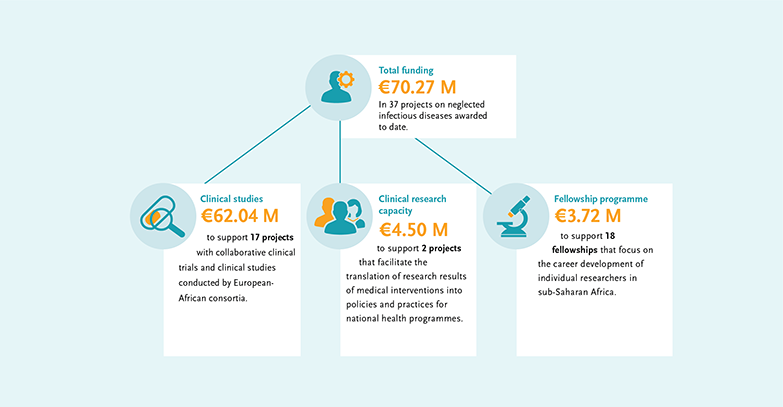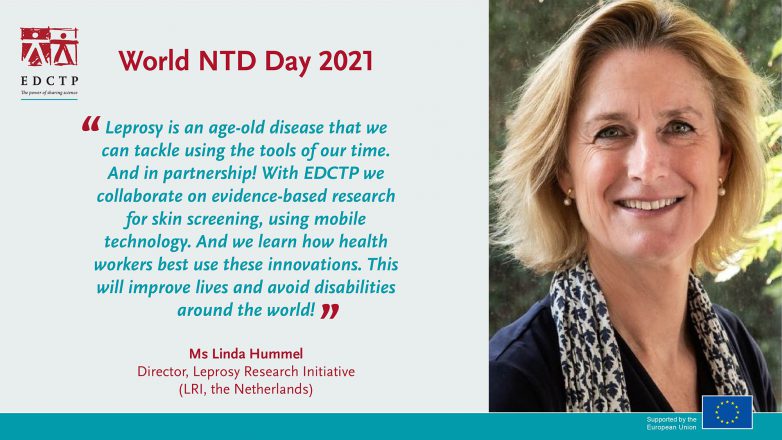World NTD Day 2021 – a global call to End the Neglect
On 12 November 2020, the member states of the World Health Organisation (WHO) officially endorsed the new Roadmap to fight neglected tropical diseases (NTD) and end NTDs as a public health burden by 2030. The WHO NTD Roadmap 2021-2030 sets global targets and milestones to prevent, control, eliminate and eradicate 20 neglected tropical diseases (NTDs) and disease groups. Importantly, it stresses integrated approaches instead of siloed single-disease programmes, thus aiming to improve coordination and collaboration. Secondly, it emphasises the need for greater ownership by national and local governments, including communities. The main global target for 2030 is to reduce the number of people requiring treatment for NTDs by 90%.
“EDCTP fully supports this agenda and the programme is already investing more than €70 million in NTD research. Moreover, NTDs remain within the scope of the envisaged EDCTP3 - EU–Africa Global Health Partnership under Horizon Europe. Africa carries 40% of the burden inflicted by NTDs which are a direct threat to more than 1.7 billion people globally. In partnership and through collaborative research we can end this neglect.”
Dr Michael Makanga, EDCTP Executive Director
EDCTP investments in NTDs research

EDCTP2 focuses on the key poverty-related infectious diseases affecting sub-Saharan Africa: HIV/AIDS, TB, malaria, lower respiratory tract infections, diarrhoeal diseases and neglected tropical diseases. The focus of our funding often aims to benefit vulnerable groups such as infants, children, adolescents and pregnant women.
The scope of the current second programme was purposefully enlarged to include the group of neglected tropical diseases relevant for sub-Saharan Africa. Almost all calls have been open to proposals for NTD research and capacity building. Two 2017 calls invited proposals exclusively on NIDs, one for product-focused implementation research and a second one for clinical trials. Moreover, new partnerships were formed such as with the Japanese GHIT Fund, the Mundo Sano Foundation (Argentina/Spain), and the Dutch-based Leprosy Research Initiative (LRI).

The studies on NTDs funded by EDCTP funds can be explored in the online EDCTP grant portfolio. As an illustration a few projects are mentioned here:
Human African trypanosomiasis
The DiTECT-HAT study evaluates a range of tools that will make it easier to detect, treat and ultimately eradicate sleeping sickness. Efficient methods of detecting the parasite Trypanosoma brucei gambiense will be essential to eradication as they will enable monitoring of at-risk populations.
Leprosy
In partnership with the LRI, EDCTP has funded two studies on leprosy, PEOPLE (which seeks to find a new way to prevent the spread of leprosy) and PEP4LEP (which compares two approaches for screening and pre-emptively treating those at risk of leprosy infection).
Onchocersiasis
The MoxiMultiDoseMod study aims to contribute to an accelerated onchocerciasis elimination through a paediatric dose-finding study. The project comprises two phase IIIb trials comparing efficacy and safety of single or annual and biannual moxidectin or ivermectin treatment and will develop mathematical models for moxidectin- and ivermectin-based elimination strategies to support country policy decisions.
Schistosomiasis
EDCTP partners with the Japanese GHIT Funding agency in the fight against schistosomiasis, a common and debilitating parasitic disease among children. The ‘Praziquantel for Pre-School-Age Children’ study develops a version of an available drug treatment adapted for young children.
Yaws
The LAMP4YAW project is evaluating a highly sensitive diagnostic test for yaws, a disfiguring and debilitating disease mostly affecting children. An effective drug is available but better diagnostics could accelerate eradication.
More information
- WHO – Neglected tropical diseases: World Health Assembly endorses bold new road map targets for 2030
- WHO – Executive summary. Ending the neglect to attain the Sustainable Development Goals: A road map for neglected tropical diseases 2021–2030
- WHO – Ending the neglect to attain the sustainable development goals: A road map for neglected tropical diseases 2021–2030 (PDF)
- World NTD Day website
- See also the EDCTP message for the first World NTD Day in 2020
- Explore supported NTD research in the EDCTP grant portfolio
- Prof. Moses Bockarie (EDCTP Director of International Cooperation (Africa) joined the board of the END Fund: END Fund announces new board member and new VP of programs
